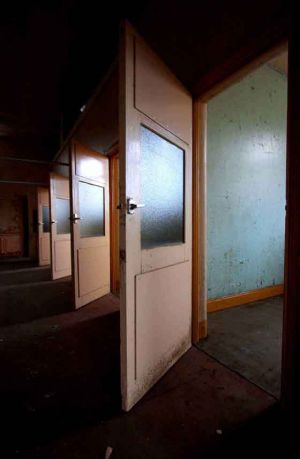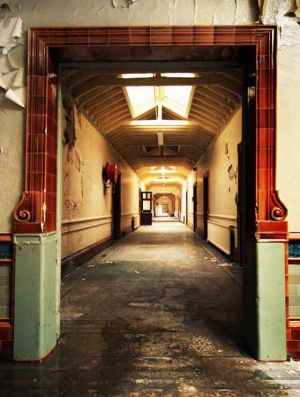REPORT OF COMMISSIONERS OF THE BOARD OF CONTROL.
West Riding Mental Hospital, Menston,
June 25th, 1926.
We began our annual inspection of this Hospital yesterday when we saw most of the female patients, and have to-day seen the rest of the female patients and the men. The bulk of the patients we saw in ward gardens. These Gardens are large, but to our minds their appearance is marred by the fact that in most of them the grass is not mown and being trampled down by the patients, they give the appearance of being uncared for. The Garden on the female side serving the two admission wards and F. 21, on the other hand had been kept mown and was a very marked contrast to others that
we saw. It was very nice here to see a game of tennis in progress and we should like to see at any rate some part of each ward garden kept mown so that Bowls or some other game could be enjoyed by the patients. We also think that if only the edges of the turf were kept mown and rolled for just the width of the mowing machine, it would make a vast difference to the appearance of the grounds.
The wards and dormitories were generally well kept, but some of the rooms on the male side are in “want of re-decoration. Through- out the Hospital there was a nice supply of books in good condition, but some of the cupboards in which the books are kept were difficult to open as there were no knobs on the doors.
We should like to see Letter Boxes, to be cleared daily, placed in every ward and if this can be managed we suggest they should be of a pattern now seen in many Mental ‘Hospitals, with a small pane of glass in front. There seemed to be a nice lot of pictures and articles of interest on the walls of the day rooms and on the female side plenty of plants and flowers, but on the male side in some of the day rooms there was not a single plant of any sort.
We think this is a great pity and believe that though there might be some breakages at first, the patients would soon get to appreciate and take care of them. We hope that in the day rooms where there are billiard tables, care will be taken to see that there are always some cues with tips on them. In one Ward (M. 6) we saw all the cues, numbering 6, but only one had a tip on it. In the Lavatory annexes we saw many W.C.s with no doors to them; we think that there should be some degree of privacy afforded to the patients and suggest that by degrees these W.C.s should be fitted with dwarf doors of the pattern that now exists in the Farm Residence, We were glad to hear that there are now 3 Loud Speakers installed on each side of the Hospital. So far as we could see the Day rooms were well supplied with cards and games and means of amusement.
In the main Kitchen we were glad to see that the Committee have very wisely supplied a fish-fryer and a Hobart Machine; we feel sure that it is money well spent. The Fish- fryers (one has also been placed in the small Kitchen) were not to-day being used owing to the shortage of gas during the strike, but we heard from many of the patients how much the fried fish was appreciated. The flooring in the passage leading to the
Main Kitchen is very badly in need of attention.
The Dinner to-day which we saw served in the Male Dining Hall consisted of Steamed Fish, with sauce and potatoes and a pudding. The Fish seemed to us to be very nicely cooked and the dinner was well served though the Hall looked very crowded.
In neither of the Kitchens is there any fixed basin in close proximity to the patients’ lavatory; this is a matter to which attention has been called in the past by Visiting Commissioners and is one to which we attach considerable importance as a means of preventing, so far as is practicable, the possibility of infections. We hope the matter will receive the consideration of the Committee.
In the Laundry we saw some cog wheels on the side of a small calendar which appeared to us to want a small guard which could we think be fixed without difficulty. We were not altogether satisfied with the steam tank for foul clothing; this tank does not hold water and the lid does not fit well in spite of some loose India rubber bands which are laid along the top edge. We think that the type of tank, in which the clothes are placed into cold water and then the live steam turned on through the water, would be very much better.
The patients themselves were very orderly and free from complaints. Many of them were anxious to talk to us and we had conversations with a great many. We were, however, not satisfied with the condition of the clothing of the men. Many of them were distinctly untidy, some of the clothes were torn, and we saw men whose appearance suggested that either they had no braces on or that their braces were not buttoned. It seemed to us that more attention on the part of the Attendants was desirable. We wonder if some dry-cleaning process, such as we have lately seen in a Mental Hospital, would not help to smarten up the clothes, coupled with a steam clothes press. We quite realize that some. of the clothing must necessarily go to the Laundry, but some might be very much improved by the means suggested above. We also noted that no nightshirts are issued on the male side except to a few men working in the Engine House. We feel that this is neither cleanly nor healthy and hope that this matter may be rectified.
Since the visit of our Colleagues in March, 1925, 552 patients have been admitted, 14 have been transferred to other care, 226 have been discharged (of whom 168 had recovered, 1 was dealt with under Sec. 25, and 45 under Sec. 79 of tho Lunacy Act) and 270 have died. With reference to the admissions, we notice that as many as 313 (i.e., 56 per cent.) were received from a Poor Law Institution.
Persons in need of Mental Hospital Treatment ought of course to receive it as promptly and with as little stress as possible, and it would be of advantage if, by mutual understanding between the authorities and Officials concerned effort could be made to reduce this proportion by arranging for certification to take place, as a general rule, at the patient’s own home.
One hundred-and-forty patients have been allowed out on trial to test their fitness for discharge, money allowances being granted in 48 cases. There arc now on the Statutory Books the names of 1,835 patients, 891 being of the male and 944 of the female sex. Six patients, two men and four women are now on leave, and one male patient lately escaped and is now in other charge, so that there are now evident in the Hospital 1,828 patients all of whom we believe we have seen. There are 201 Private patients, of whom 16 are Service and 6 ex-Service Patients. There are only 2 Out-County Patients.
Parole is granted to only 38 patients (all males), 11 of whom are allowed beyond the grounds. It therefore applies to scarcely 5 per cent. of the men, a very small proportion compared with many other Mental Hospitals. We should like to see it greatly increased and we suggest that, if the patients were carefully grouped according to trustworthiness and habits of industry, it ought to be at once possible to administer M. 7 Ward and the Farm Residence upon the open door principle, and so that all the 90 patients in these two units might be regarded as having parole of the Estate. Similarly the 47 women in Ward 21 if carefully classified might be regarded as having parole at least of their Ward Garden.
Referring again to the Ward-Gardens, we think that far greater advantage could be taken of them. As we have stated it was here that we saw and spoke to most of the patients. Walking about was being indulged in by comparatively few; most of the patents were sitting down on benches placed in groups; in general these groups represented a Ward or pair of Wards, a tad it seems, especially on the female side, that the patients are only allowed to walk about in batches. This practice largely nullifies the value of Ward-Gardens and must inevitably engender a quite unnecessary sense of constraint, which, indeed, we thought, by their manner and conduct, was definitely noticeable in the patients of male wards 3 and 4, all of whom were rigidly confined to one grass plot closely hedged about by a ring of seats placed with their backs to the asphalt paths. We hope this practice will be discontinued. We suggest that it would be a welcome change to the patients and would promote contentment and health, could arrangements be made to allow them, weather permitting, to take some of their meals out of doors; on such a warm and fine day as to-day, it would certainly have been preferable to assembling in so largo a number as 440 in the Hall.
The Death-rate during 1925 was 11-5 per cent., the percentages among the men and women being 9-3 and 13-7 respectively. Among the deaths were two cases of suicide in both of which the act in question was committed before admission; two cases due to scalding, one to abdominal injuries inflicted by another patient who had been removed to Broadmoor, one to suffocation in an Epileptic Fit and one in which death was accelerated by fracture of the leg accidentally sustained. The circumstances of these 7 deaths were fully
reported to our Board at the time and each, as well as two other cases were the subjects of Inquests. Apart from these cases all the 122 male and 148 female deaths were from natural causes, verified in 63 per cent. by Post Mortem Examination a proportion which we should like to see augmented.
In contrast with 6 female cases, there were no less than 20 instances among the men in which a bed sore existed at death: that is in 16 per cent. of the male deaths a proportion which we suggest merits fuller analysis and perhaps closer attention to the consideration of patients in terminal stages of illness on the male side. We can however repeat the commendations which our colleagues made last year as to the thorough knowledge of cases exhibited by Members of the Medical and Nursing Staffs, and we have been favourably impressed with the careful manner in which the Medical Records are kept.
In this connection we nevertheless desire to make a strong appeal for the provision in every Ward of a Clinical Room. The incidence of Tuberculosis is a matter which we hope will receive unremitting attention. When our Colleagues last visited, the number of known cases in the Hospital was 5 males and 6 females. Since that date, according to the figures given to us to-day, the deaths in which this disease was returned as a primary cause have been 4 males and no less than 25 females, to which from our inspection of the Post Mortem records, three males and one female might fairly be added. The number of cases of Tuberculosis in the Hospital to-day is believed to be 5 on the Male and 7 on the Female side, besides one member of the Male Staff.
The Laboratory, to our great satisfaction, we see is in course of re-equipment. How far even with the help of a Laboratory Assistant, proper advantage can be taken of it, we are very doubtful We say this because we cannot see how four Assistant Medical Officers can fairly be expected to overtake the Medical requirements of over 1,800 patients, coupled with the heavy annual rate of admissions that normally prevails here. It is with regret that we find no Dental Surgeon has yet been appointed.
(Signed) HERBERT C. BAILEY,
(Signed} C. HUBERT BOND,
Commissioners of the Board of Control.
Memoranda on Commissioners’ Report.
(1) Uncared for appearance of grass in Ward Gardens.
(2) Re-decoration of Wards and Dormortories.
(3) Absence of knobs on doors of Book cupboards.
(4) Absence of Letter Boxes in Wards.
(5) Day Rooms@Male Side@Suggested provision of plants.
(6) Billiard cues un-tipped.
(7) Provision of dwarf doors for W.C.s in Lavatory Annexes.
(8) Repair of flooring in passage leading to Main Kitchen.
(9) Kitchens@Provision of fixed basins in close proximity to patients’ lavatory.
(10) Guarding of cog wheels on small callender in Laundry.
(11) Steam tank for foul clothing.
(12) Male Patients’ clothing.
(13) Nightshirts for Male Patients.
(14) Question of admission of Cases direct from their own Homes.
(15) Parole@Suggested increase.
(16) Methods of utilization ofWardGardens.
(17) Appeal for the provision of a Clinical Room in every Ward.
(18) Incidence of Tuberculosis.
(19) Appointment of a Laboratory Assistant.
(20) Dental Treatment for Patients
All content copyright protected.








